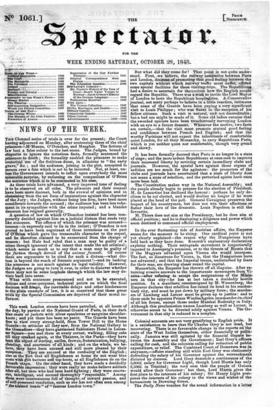In the ever fluctuating tide of Austrian affairs, the Emperor
seems for the moment to be rising. One cardinal point is not yet clearly explained—the reason why the Hungarians have held back as they have done. Kossuth's explanatory declaration explains nothing. Their retrograde movement is conjecturally imputed to Auersperg's promises, or to the threats of Russia that if the Magyars advanced upon Vienna she would interpose. The fact, so disastrous for Vienna, is, that the Hungarians have not advanced ; and that the Imperial troops, undisturbed by fears for their rear, are drawing closer round the capital. Meanwhile, the Emperor has thrown off all disguise. After re- turning evasive answers to the importunate messengers from Vi- enna—after refusing to accept the resignations of the Minis- ters in that city—he has at last taken a decidedly hostile position. In a manifesto: countersigned by M. Wessenberg, the Emperor declares that rebellion has raised its head in his residen- tiary city, and must be put down by military force; the murder- ers of Lamberg and Latour must be given up to justice: and to those ends he appoints Prince Windischgratz commander-in-chief of all his forces, except those under Marshal Radetzky in Italy. Although this proclamation names Lamberg as well as Latour, it otherwise seems to be directed solely against Vienna. The Go- verninent in that city is reduced to a nonplus.


























